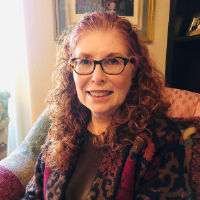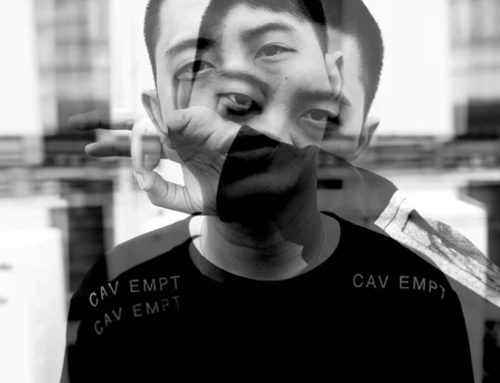What is schizoid personality disorder? Is it like schizophrenia or schizoaffective disorder? In today’s show, our guest, psychologist Elinor Greenberg, PhD, sheds light on schizoid personality disorder and reveals how people with this condition experience the world. Click on the player below to listen now!
SUBSCRIBE & REVIEW
Guest information for ‘Schizoid Personality Disorder’ Podcast Episode
 Elinor Greenberg, PhD, is a psychologist and internationally renowned Gestalt therapy trainer and consultant who specializes in teaching the diagnosis and treatment of Borderline, Narcissistic, and Schizoid adaptations. She is a faculty member of the NY Institute for Gestalt Therapy, the Gestalt Center for Psychotherapy and Training, and a former faculty member of The Masterson Institute (a post-graduate training institute in an object relations approach to the theory and treatment of personality disorders), and an Associate Editor of the peer reviewed journal Gestalt Review.
Elinor Greenberg, PhD, is a psychologist and internationally renowned Gestalt therapy trainer and consultant who specializes in teaching the diagnosis and treatment of Borderline, Narcissistic, and Schizoid adaptations. She is a faculty member of the NY Institute for Gestalt Therapy, the Gestalt Center for Psychotherapy and Training, and a former faculty member of The Masterson Institute (a post-graduate training institute in an object relations approach to the theory and treatment of personality disorders), and an Associate Editor of the peer reviewed journal Gestalt Review.
Dr. Greenberg has been the recipient of two Quora Top Writer awards for her posts on personality disorders and writes an online blog “Understanding Narcissism” for psychologytoday.com. Her articles have been republished online by Forbes, Business Insider, Apple News, Thrive Global, You Tango, and The Mind’s Journal. She is also the author of the book: Borderline, Narcissistic, and Schizoid Adaptations: The Pursuit of Love, Admiration, and Safety, which explains the diagnosis and treatment of personality disorders in a clear and easy to understand way. She is in private practice in NYC and can be reached through her website: www.elinorgreenberg.com.
Computer Generated Transcript for ‘Schizoid Personality Disorder’ Episode
Editor’s Note: Please be mindful that this transcript has been computer generated and therefore may contain inaccuracies and grammar errors. Thank you.
Announcer: You’re listening to the Psych Central Podcast, where guest experts in the field of psychology and mental health share thought-provoking information using plain, everyday language. Here’s your host, Gabe Howard.
Gabe Howard: Welcome, everyone, to this week’s episode of The Psych Central Podcast. Calling into the show today, we have Dr. Elinor Greenberg. Dr. Greenberg is a psychologist who has been practicing psychotherapy for over 40 years and is a specialist in the diagnosis and treatment of personality disorders. She is the author of the book Borderline Narcissistic and Schizoid Adaptions: The Pursuit of Love, Admiration, and Safety. Elinor, welcome to the show.
Elinor Greenberg, Ph.D.: Thank you, I’m so happy to be here and to introduce the audience today to schizoid personality disorder.
Gabe Howard: Well, we are very happy to have you, and I know that we’re here to talk schizoid personality disorder, but let’s back up for a moment and discuss personality disorders in general. What exactly is a personality disorder?
Elinor Greenberg, Ph.D.: Well, it can be defined in different ways. The way I really like best is to think about how it’s created. Small children want to please their parents. If you’re a small child with a particular temperament and you’re born into a family, you creatively adapt to what your family wants of you, if you can, and that maximizes the amount of love and support you get. Some of these adaptations become habits that you carry into adulthood. And while that worked in your family, they’re not going to work very well for you as an adult. They’re long standing, they are intertwined with your basic personality because they started usually before the age of four, when personalities are forming. You automatically do them in the same way you automatically might use a fork or chopsticks without much thought. Your fallback response.
Gabe Howard: We know that that’s what a personality disorder is, but what is a schizoid personality disorder?
Elinor Greenberg, Ph.D.: This is a very interesting personality disorder because about half of the people who have it, they find a way to adapt to it that doesn’t disturb anybody and they go about their business. They’re very functional on the outside. So they don’t get any publicity because they’re not causing trouble, but they’re trouble waiting to happen. And you would never guess that anybody was suffering the way they are on the inside. That the behaviors are more than just acquiescence to normal rules, that they’re beginning to be inauthentic, frightened, reacting out of fear.
Gabe Howard: You said that they’re not really causing any trouble, but there’s major problems with it. Can you kind of define that a little? Because I think maybe the average audience member hearing there’s no trouble would think, what are we doing here?
Elinor Greenberg, Ph.D.: Yeah, the trouble is inside. Most of my schizoid clients tell me pretty much some version of the same history, they were intruded upon. They were treated as tools to be used. They didn’t feel that they had any rights as human beings. Sometimes they were told this. The parents said, I paid for it. It’s mine. I can do with it what I want. And then they throw out their favorite doll. The child learns to adapt to that, but they adapt by thinking I am worthless. The only person who cares for me is me. The adults are negligent at best. They might be abusive. What I mean by abusive is one man told me a story that broke my heart. He was talking in therapy about his favorite blanket as a child. He was really attached to it. And I asked where it was today. Does it still exist? He says, It’s in my old closet, in my parent’s home on a shelf. And I said, Why don’t you just ask for it? Go get it? And he says, oh, I could never do that. He says if my parents knew I cared about it, they would throw it out.
Gabe Howard: So it sounds like these are created out of a necessity to protect oneself, a desire to make it to adulthood, to survive. It almost sounds like a survival instinct.
Elinor Greenberg, Ph.D.: You’re absolutely right. The primary issue of individuals who have made schizoid adaptations in childhood is interpersonal safety. When they’re close to people, they don’t feel safe. Maybe they’ll have one or two people in their life. They generally choose to live alone. They often don’t marry. If they do get married, it’s a very special kind of marriage and unlikely to work unless they marry another schizoid and they’re equally able to adjust to each other. It creates a lot of difficulties further on.
Gabe Howard: Let’s kind of dive into it, what are the main symptoms of schizoid personality disorder?
Elinor Greenberg, Ph.D.: The major one is disassociation from your body, from your life, from
yourself. You live in your head, the body is treated like a tool because in many ways you were treated like a tool. What do I mean by a tool? One man told me, I feel like my parents only pay me attention when they have a use for me. I’m like the vacuum cleaner. They take me out of the closet and then they expect me to go back in and be quiet when their use for me is over. So one of the major issues is how to reconnect them with their head and their heart and their body. In a disassociated state, the person can function at work, appears normal to other people, but inside they tell me they feel like a robot, like they’re not really there. Another thing is social phobia, social anxieties, the fear of being in groups, the fear of being close to other people physically. My schizoid clients, when I give them a choice in the first session where to sit, they choose one of two places, either as far from me as possible or as close to the exit door as possible. And one man, I asked him, where would you like to sit? And I’m talking about a lawyer, very well spoken, very interesting person. And he gave me a funny look. He says, you really want to know where I’d like to sit? I said, Yeah. He said in the halfway as far from you as possible.
Gabe Howard: Just like that? Just was able to just look you in the eyes and say, I want to be as far away from the person I’ve asked to help me as possible?
Elinor Greenberg, Ph.D.: That’s right, and he was very honest, as I say, some people can’t put things into words very well, but my clients are usually fairly high functioning. And I’ll tell you something interesting. Before the Internet, I’m doing this a long time. The only people who came in with the correct diagnosis for themselves that they had found were my schizoid clients because they could intellectually distance themselves from any feelings about the diagnosis and just do a research search. And I often learned a lot because they would recommend books to me that described them. And I hadn’t at the time. I started doing work with people without being trained, particularly in that diagnosis.
Gabe Howard: So let’s talk about these they prescribe books or pop culture. Where is this represented? Because up until well, meeting you, I’ve never even heard of schizoid personality disorder. So are there famous movies, television shows, books where this is represented?
Elinor Greenberg, Ph.D.: There are, but they don’t tell you this is specifically schizoid. The first schizoid movie that I remember seeing very clearly was Woody Allen’s movie Zelig. Have you ever seen it?
Gabe Howard: I have not.
Elinor Greenberg, Ph.D.: And in it, Zelig changes physically, personality wise with each experience, but one that more people will have seen is Ip In the Air with George Clooney. Have you ever seen that?
Gabe Howard: Yes, that one I have seen.
Elinor Greenberg, Ph.D.: Well, that is a classical, high functioning schizoid adaptation we’re watching. And George Clooney has one of the compromises that schizoid people make in order to have contact with people, but to be safe and to maintain their autonomy, to be self-reliant and not to feel trapped by anybody else to be used is they have partial relationships with people. And in the movie Up In the Air, his job is to go around the country firing people. And the only people he’s really close to are the people who work in the airports because he goes through them regularly. And there’s one woman who he forms a brief sexual relationship with. He lives an entire life without any intimate relationships, but with enough contact to make him feel OK. And then when he thinks about wanting a different kind of life, the woman he had had sexual relations with, he doesn’t bother to call her. He doesn’t really understand deep human relationships that are intimate. He doesn’t contact her. He doesn’t invite her out on a date or say he wants more. He shows up at her house with flowers unannounced and she doesn’t let him in. She’s married with children. That would be a schizoid’s clumsy attempt to make contact with someone. But because they lack the intimacy skills for real contact, they’ve skipped a few steps. And it doesn’t turn out well for George in the movie.
Gabe Howard: Well, without giving away the movie and just talking about in general, what are some typical schizoid relationship patterns that people are experiencing? And that’s kind of question number one. And question number two, how do they avoid them? How do people get help for this?
Elinor Greenberg, Ph.D.: I’ll start with the patterns. Now the dilemma is closeness to people is felt as dangerous. They can control you, they can take what’s yours, they can treat you as a tool. Schizoid people do not know how to negotiate at all. They cannot negotiate differences. They didn’t have an opportunity at home to learn that this was possible in their environment. So they believe either they have to stay and be dominated or they have to leave. And when they leave, they feel so disconnected they can fall into a kind of existential dread, depression, where they feel like they’re living a meaningless life. They’re just marking time until they die. Nothing has true meaning for them. This is their dilemma. So the relationships are a compromise between being trapped and being so totally alone that you feel like you’re going out of existence almost. You have no connection to other human beings. So they have one partial relationships and how you have a partial relationship. You can have a relationship with a married person. So you only see them every so often. You can have geographically distant relationships where you see someone four times a year because they live on the other side of the world. You can go in and out of relationships. I had one person who every year he tried to make a relationship with this one woman.
Elinor Greenberg, Ph.D.: He loved her, but he would shut down and disassociate after two weeks. He did this for five years running. And in the beginning, he blamed her because he didn’t know what was going on. Then he finally went to therapy and he realized that he needed to do some more work on himself before he could feel safe and he needed to get some other coping skills. Now, he had great coping skills at work. I’m talking about professional people. So they go to work every day, but their work coping skills do not transfer into the intimate realm. I’ve had clients that went after married people. They were convinced they were in love and they went full forward and they finally got the person to divorce the husband or the wife, whatever. And then they told me I shut down. I don’t know where the feelings went. As soon as the person was fully available, the wall came down between them and the other person. And emotionally, they felt trapped and had to leave.
Gabe Howard: You talk a lot about defenses when you write about a schizoid adaptation, what are some stereotypical defenses?
Elinor Greenberg, Ph.D.: Well, I’ll give you one that concerns me, because I think that it’s coming to a head now. Before the Internet, people with schizoid adaptations were more or less forced to find a way to interface with other humans. And some of them adapted and became less fearful and they made friends outside the home. Now we have these kids who are growing up with the Internet. And if they have a tendency to go in a schizoid direction, they’re in their room. They don’t have to leave their room. I have clients I have to persuade to go out in the sunshine because they’re gaming online. They’re doing everything online. They found a way to work online and they’re very effective in the tech industry. A lot of people go into it because you can control a computer, you can control a software program in a way that you can’t control other people. So why is this a problem? Well, imagine you’re a mother or father and your kid’s been great through school. They do whatever you tell them. They spend a lot of time in their room studying. They learn computers really early and quickly, and now they have a great job. Well, why should you be worried? They’re a total loner.
Elinor Greenberg, Ph.D.: They fear other people and they lack the social skills to ever date and marry. And when they date, they tend to choose unavailable people as the schizoid compromise or they have a very rich fantasy life that substitutes their real life. Now, what do I mean by a fantasy life? I had a young woman who had very elaborate fantasies about this one guy. I’ll call him Carlos. And Carlos, she had only met him a few times, but she fantasized about dating him in great detail. She spent hours with he says this and I’ll say that in her mind. When she came to therapy, I encouraged her to actually talk to Carlos more, and she did. And then they started dating and then she came back to therapy. And she says, I have a real dilemma. She says, I don’t know that I like the reality of being with Carlos. He says unexpected things that I didn’t think he
would say. In my head, I know exactly what’s going on. I say this and he’ll say that. But in real life, I don’t have any control over him. And I have to respond to what’s ever happening in real time. And I’m not sure if I can do that.
Gabe Howard: We’ll be right back after these messages.
Sponsor Message: This episode is sponsored by BetterHelp.com. Secure, convenient, and affordable online counseling. Our counselors are licensed, accredited professionals. Anything you share is confidential. Schedule secure video or phone sessions, plus chat and text with your therapist whenever you feel it’s needed. A month of online therapy often costs less than a single traditional face to face session. Go to BetterHelp.com/PsychCentral and experience seven days of free therapy to see if online counseling is right for you. BetterHelp.com/PsychCentral.
Gabe Howard: And we’re back discussing schizoid personality disorder with Dr. Elinor Greenberg.
Elinor Greenberg, Ph.D.: I give a very simple test and the audience can take this, and it won’t tell you that you have a personality disorder. What it will tell you is what is important to you in an interpersonal relationship? What do you have to have? So if I ask people who I think might have a personality disorder, but even ones without which they feel closest to, what do you need in a relationship? Take these three things and put them in order with the thing you need most. Here’s the three things, and, Gabe, if you want to play with it, you can play with it too. Love, admiration or safety? Love represents all the nurturing, soulmate, re-parenting, that type of thing. Very romantic and reparative attachments to people. Admiration is respect, status, idealization of you by other people, envy of you by other people. Other people see you as perfect above them. Or for safety. Safety is you have autonomy. You take care of yourself. The person isn’t intrusive. You can control how close you get to them. All three are important to everybody, but one or the other is most important. And it’s what you have to have to be in a relationship with someone. Do you care to play, Gabe? What would be first on your list, love, admiration or interpersonal safety?
Gabe Howard: I would probably go with interpersonal safety, admiration and then love.
Elinor Greenberg, Ph.D.: Ok, well interpersonal safety, admiration, love. So that would put you closest to the way that a schizoid would answer.
Gabe Howard: Ok, that’s.
Elinor Greenberg, Ph.D.: Yeah, in the interpersonal safety. I’m closest to what a borderline
would answer. I put love first, connection, that feeling. I’ve learned to raise safety up a bit. So if I give this as a little mini test and it doesn’t mean you have a personality disorder, it doesn’t mean you’re schizoid, we all tend to have our own priorities. I have been in a lot of relationships where safety didn’t cross my mind. It doesn’t usually cross my mind. I’ve learned to make it cross my mind, but it’s not my preoccupation. I don’t first vet people for safety. If you’re schizoid, you do. If you’re schizoid, you’re hypersensitive to how close people are standing to you, how dominating their movements are, how loud their voices, whether they invade your personal space. So those are all big concerns. Can I get out of this relationship? Does this person let me be me? All of these are safety questions. Love questions are do they love me? Will they stay with me or will they take care of me? Things like that. Admiration questions are do they admire me enough? Do they think I’m important? So there’s a different emphasis. Now my narcissistic clients, always take admiration of some kind and they don’t even think about safety.
Gabe Howard: You know, it’s interesting now that I have a little more information about it, I kind of want to move admiration almost off the list. I just assume that my partner doesn’t admire me, and I don’t mean that in any negative thing. I just I’m not looking for a partner who admires me. I guess I want them to respect me or to, like, think I’m a good person. But in my mind, admiration is like I admire, you know, Dr. King. I admire, man, I’m having trouble coming up with people who I admire. I’m a little flummoxed.
Elinor Greenberg, Ph.D.: Well, and so I found that this was a fairly easy way to give people an idea or at least to start a discussion of what is important to you and why, and we sort of go from there.
Gabe Howard: Sorry, ladies and gentlemen, I will not have therapy on the air, but I, it’s fascinating, though, because I think that a lot of people are so terrified of the idea that it might be them or they often see other people in some of the things that we talk about on the show. And just to kind of, you know, wrap this up in a nice little bow, thinking that you might be fill in the blank just means you should get it checked out. Right? You know, make an appointment with a therapist. Ask if they specialize in this. I go to the physical doctor, and I’m making air quotes, all the time for all kinds of reasons. It doesn’t mean that I have everything that I think that I have. It just means I’m middle-aged and my body’s falling apart.
Elinor Greenberg, Ph.D.: Absolutely, and I’m going to give you a very simple thing that a lot of people can identify with. Many of my clients, schizoid clients, often report that by age seven, they had realized they couldn’t depend on the caretakers of their life to care about them, that the only route to safety was to become independent. So if you focus on financial independence, on having your own space, on not owing anybody anything. They won’t ask for favors. They don’t know that they can negotiate differences. So by age seven, they were already figuring out
what they needed to totally take care of themselves so that they could feel safe in a way that their parents didn’t make them feel safe. So if any of you out there remember thinking, oh, I can’t depend on anybody but myself. And you still feel like that. That you can’t depend on anybody but yourself, other people are dangerous or potentially dangerous to who you are as a human being to not take advantage of you. There’s also a weak sense of identity because we depend on our parents when we’re little to be mirrors for us.
Elinor Greenberg, Ph.D.: We get a sense of who we are from them. But some parents, it’s not always the parents’ fault. Think about the person that is uprooted a lot. They have a sick mother. The mother is in the hospital at key times in their childhood. They’re sent to live with the mother’s sister, the aunt, because the father has to go to work every day and then the mother is in the hospital longer than they expect. So they are forced to live with another aunt. Now they’re with their third set of people. Or they’re in foster care. And in the beginning, they root very strongly and they have attachments to these people, but then they’re uprooted. And if you uproot a plant, for any of you guys who have plants and you continually uproot the plant time after time, it’s going to become harder for that plant to thrive. So it doesn’t have to be mistreatment on purpose. But sometimes you get a perfect storm of situations that just make the kid feel unsafe on their own and that they don’t dare really connect to other people. So they begin to find something else to connect to that they can control.
Gabe Howard: Dr. Greenberg, thank you so much. The last question that I want to ask you is, this is treatable, right? People can come to someone like you and lead better lives. They can do better. I think sometimes people think that personality disorders are untreatable, uncurable and nothing better will ever happen. I read the Internet and personality disorders are just picked on more than any mental health issue that I can find.
Elinor Greenberg, Ph.D.: Yes, it is treatable. Every habit that we have, in order to learn to play a musical instrument, you have to be shown and then you have to practice. Once you practice, it is in your brain. Every time you practice, the brain’s connections get more and more connected so that you can play more simply, better. You have a better grasp of what you’re doing. So this is not really that different, except it has an emotional overtone to it. So what we’re looking at is a set of habits that were gradually acquired and assumptions. Like I am dealing right now with somebody who has the assumption that it’s pointless to try and argue with anyone. I just have to do what they say. I’m marking time until I die. So that’s a habit. That’s a viewpoint. Even cognitive behavioral therapy can challenge that habit. Is it really true that there’s nothing you can do about it, that everybody will take advantage of you? So I might work on a more nuanced thing. Some people will take advantage of you. How can you learn to distinguish those people and also look at negotiation? Well, if you don’t state what your boundaries are, people are likely to overstep them. Rather than make yourself smaller and smaller or keep moving back, you can
simply say, I don’t like it when you come that close to me. Could you take a step back? So there’s a lot of things to do. Basically, we identify what they’re doing now to cope. The purpose of what they’re doing now. And then we start to experiment with other things they can do that aren’t so extreme. I’m working on with one client, how do you tell yourself that someone’s not going to abuse you? That someone will be kind? Something as simple as that.
Elinor Greenberg, Ph.D.: So it’s very treatable. It’s a long therapy because many of my schizoid clients find coming week to week too intense for them. My schizoid clients, I can’t talk directly to them about them because it could feel very intrusive. You don’t tell a person with schizoid personality disorder, this is why you feel the way you do or I see how you feel. I understand that. Those words go into them. It feels like you’re trying to read their mind. Invasion of the Body Snatchers is a schizoid movie, The Walking Dead, that’s a schizoid preoccupation. All of this stuff is treatable if you’ve trained properly. Many people who go to a therapist do not realize we don’t learn psychotherapy when we get our degree. I have a Ph.D. in psychology. I have a master’s in psychology. I have a bachelor’s in psychology. None of that taught me psychotherapy. I had to go to a postgraduate training institute. I’m certified as a Gestalt therapist. Seven years of training minimum in that that I did. But when I came to wanting to work with people with personality disorders, I went and I spent ten years at the Masterson Institute. The ten years, part of it was on the faculty. I did a three year training group. I did a three year certification. Why am I saying this? Because you need to be an informed consumer. You need to know what degree the person has. You need to ask them. Do they have training in personality disorders? What training? Did they take a weekend seminar or did they spend ten years of their life? It’s a big difference. We have to be a bit more informed and ask more probing questions.
Gabe Howard: I could not agree with that more. Thank you so much for being here. Can you tell us where to get your book, your website, any information that our listeners would need to track you down?
Elinor Greenberg, Ph.D.: Certainly. I have the most minimal website in the world. It’s ElinorGreenberg.com. My book is available on Amazon and in certain psychology bookstores. And I also write for Psychology Today a free blog called Understanding Narcissism, and I’m introducing schizoid, too. I also answer questions from Quora.com and we have over 1,800 of them there.
Gabe Howard: Dr. Greenberg, thank you again, thank you for raising awareness about schizoid personality disorder. And to our listeners out there, here’s what we would like you to do. If you love the show, please subscribe, please rank and review. Share us on social media and share this episode with anybody who you think could benefit from it and use your words. Tell them why they should spend a half an hour listening in. And remember, you can get one week of free, convenient, affordable, private online counseling any time anywhere, simply by visiting BetterHelp.com/PsychCentral. We will see everyone next week.
Announcer: You’ve been listening to The Psych Central Podcast. Want your audience to be wowed at your next event? Feature an appearance and LIVE RECORDING of the Psych Central Podcast right from your stage! For more details, or to book an event, please email us at show@psychcentral.com. Previous episodes can be found at PsychCentral.com/Show or on your favorite podcast player. Psych Central is the internet’s oldest and largest independent mental health website run by mental health professionals. Overseen by Dr. John Grohol, Psych Central offers trusted resources and quizzes to help answer your questions about mental health, personality, psychotherapy, and more. Please visit us today at PsychCentral.com. To learn more about our host, Gabe Howard, please visit his website at gabehoward.com. Thank you for listening and please share with your friends, family, and followers.













